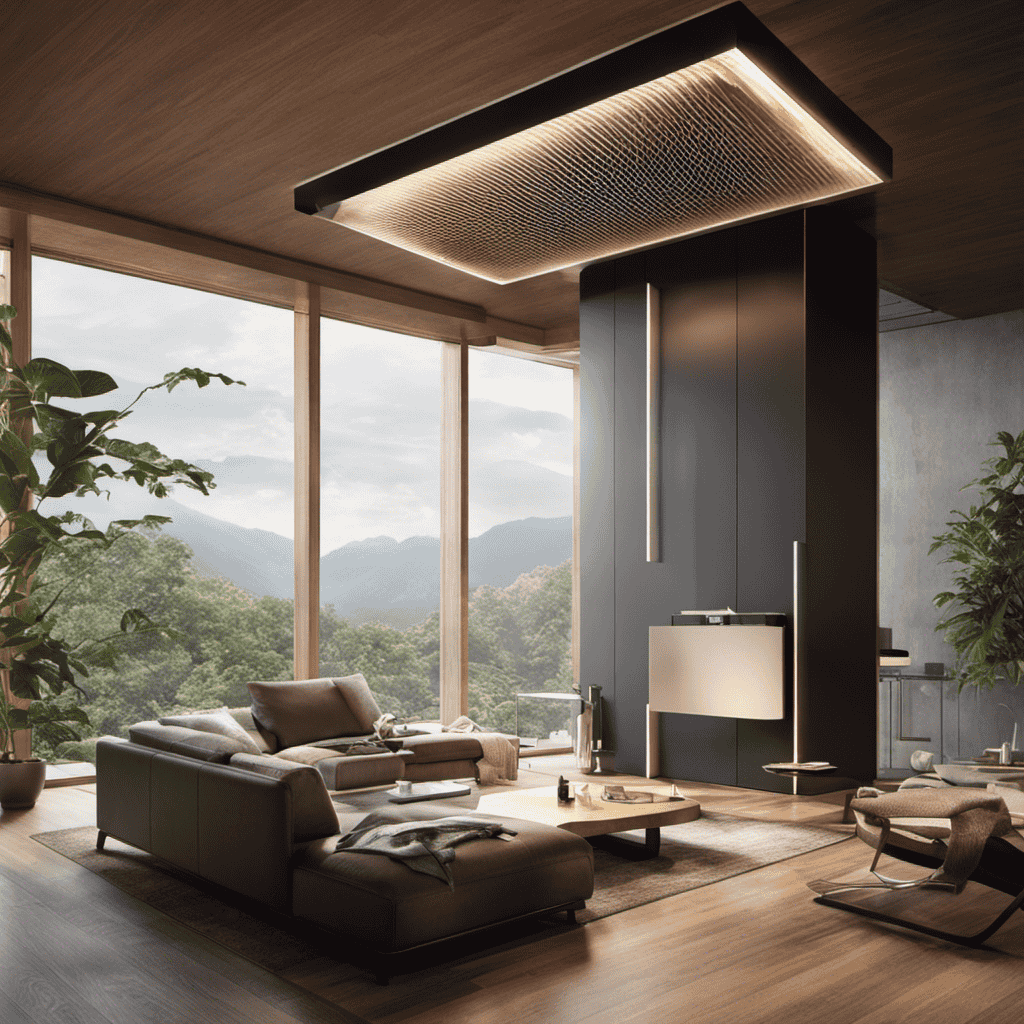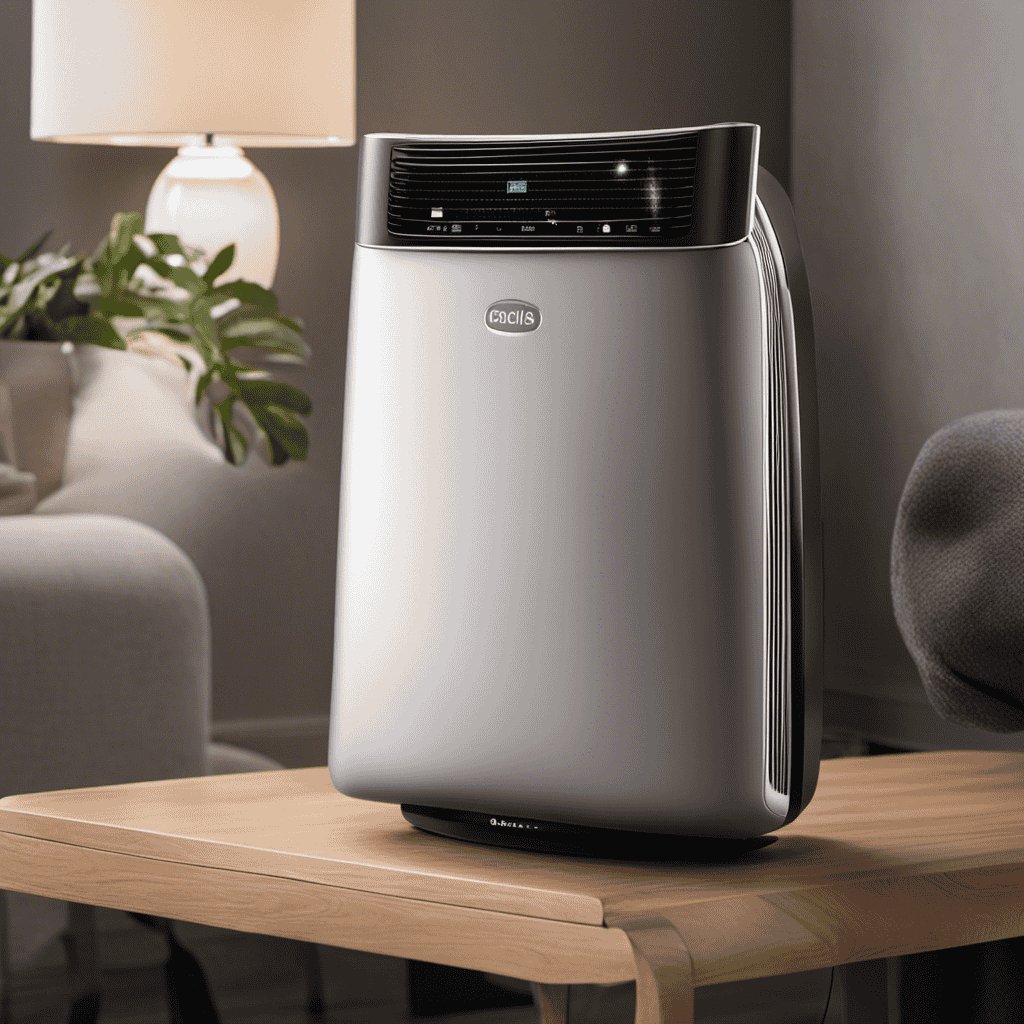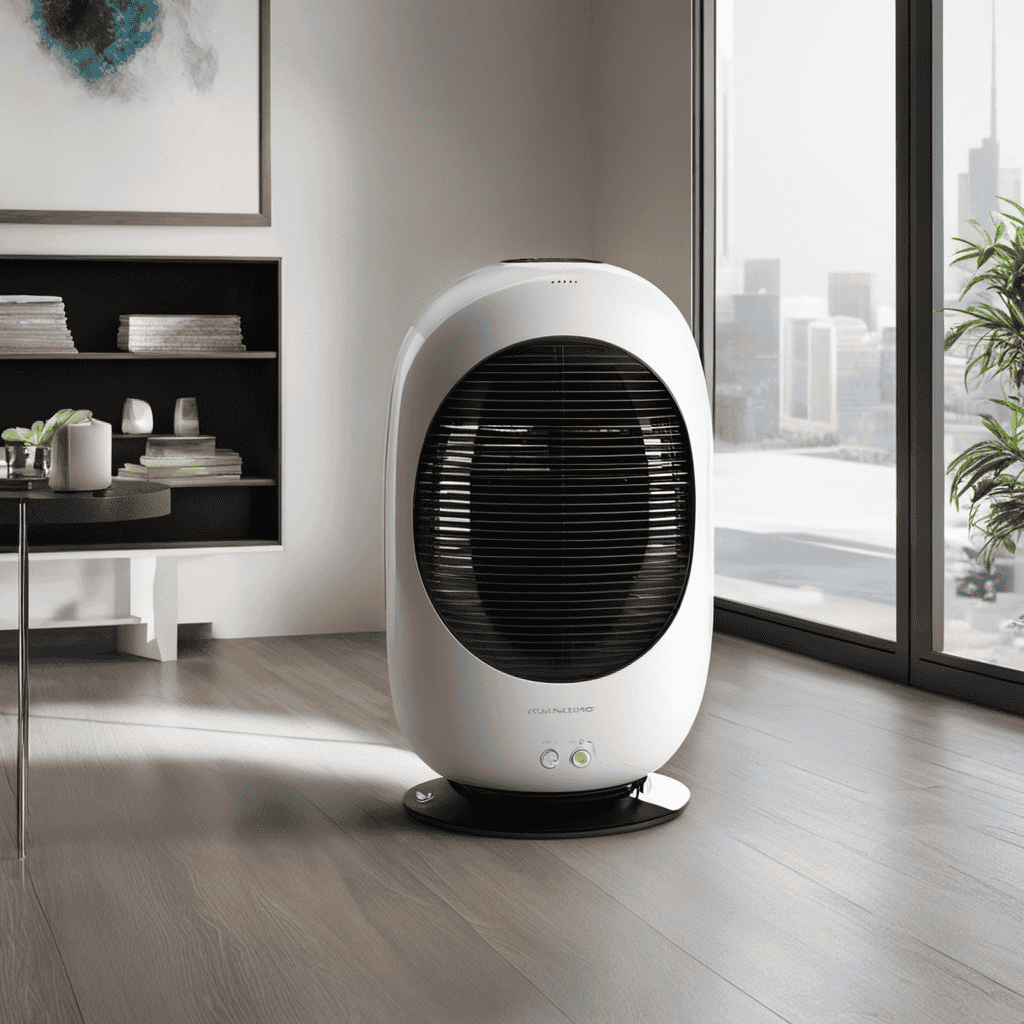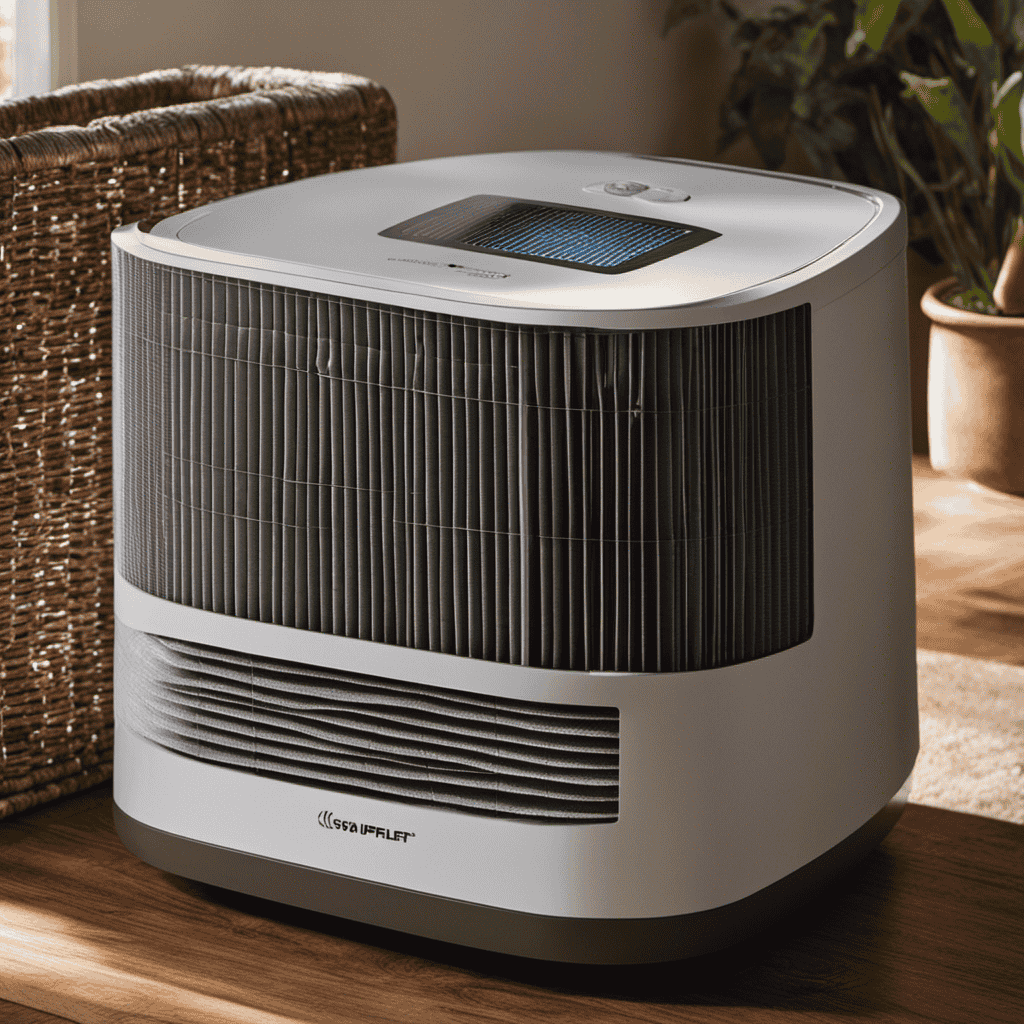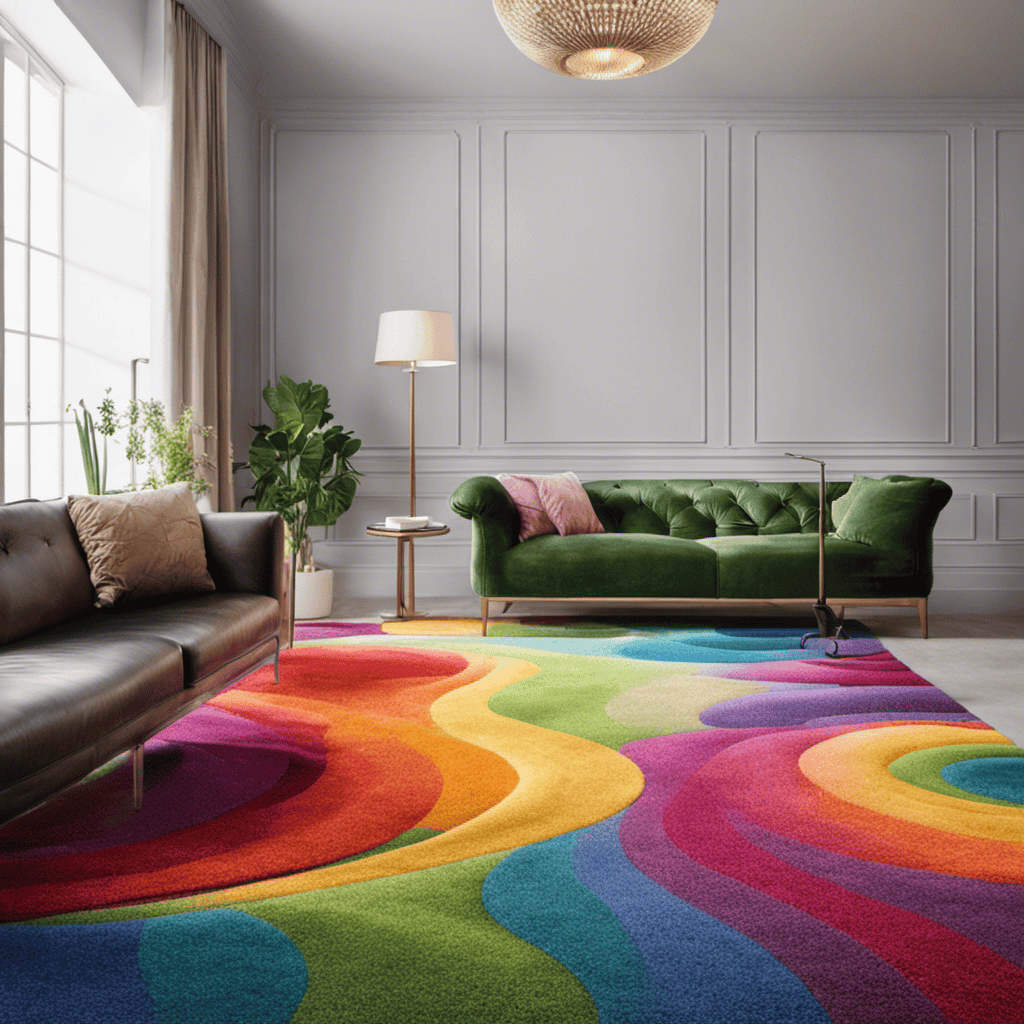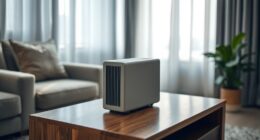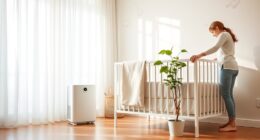Ever wondered about the inner workings of a HEPA air purifier? Allow me to explain it to you.
HEPA technology, short for High-Efficiency Particulate Air, is the backbone of air purifiers. These devices use a filtration process that can trap and remove airborne particles, improving indoor air quality.
With their ability to capture allergens and pollutants, HEPA air purifiers play a crucial role in reducing respiratory health risks.
In this article, we will explore the efficiency and debunk common misconceptions about these powerful machines.
Key Takeaways
- HEPA technology is the backbone of air purifiers, capable of trapping particles as small as 0.3 microns and removing up to 99.97% of particles from the air.
- The filtration process of HEPA filters involves capture, retention, and interception, with the fine mesh of fibers capturing particles like dust, pollen, and mold spores.
- HEPA filters improve indoor air quality by capturing and retaining tiny particles, preventing them from recirculating into the room.
- HEPA filtration is important for removing allergens, dust, pet dander, harmful pollutants, reducing the risk of respiratory infections, and enhancing overall well-being.
The HEPA Technology Behind Air Purifiers
To understand how HEPA air purifiers work, you need to know the technology behind them. HEPA stands for High-Efficiency Particulate Air, and it refers to a type of filtration system used in air purifiers.
These filters are made of densely packed fibers that can trap tiny particles as small as 0.3 microns in size, such as dust, pollen, pet dander, and even some bacteria and viruses.
The benefits of HEPA filtration are numerous. Firstly, it helps to improve indoor air quality by removing harmful pollutants that can cause allergies or respiratory issues. Secondly, it reduces the spread of airborne diseases by capturing and trapping pathogens. Lastly, HEPA filters are highly efficient and can remove up to 99.97% of particles from the air, ensuring a cleaner and healthier environment.
Understanding the Filtration Process of HEPA Air Purifiers
Take a moment to understand how the filtration process of HEPA air purifiers actually functions.
HEPA, which stands for High Efficiency Particulate Air, is a type of filter that is highly effective at trapping airborne particles.
The filtration mechanism of HEPA air purifiers involves three main stages: capture, retention, and interception.
As air passes through the filter, the fine mesh of fibers captures particles such as dust, pollen, pet dander, and mold spores.
These trapped particles are then retained within the filter, preventing them from re-entering the room.
Additionally, the filter intercepts larger particles, preventing them from reaching the inner layers of the filter.
The benefits of HEPA air purifiers are numerous.
They help improve indoor air quality by removing harmful pollutants, allergens, and irritants from the air, promoting a healthier living environment for individuals with respiratory conditions or allergies.
How HEPA Filters Trap and Remove Airborne Particles
As air flows through the HEPA filter, it captures and retains tiny particles like dust, pollen, and pet dander. HEPA, or High-Efficiency Particulate Air, filters are an essential component of air purifier technology. These filters are designed to remove 99.97% of particles that are as small as 0.3 microns in diameter.
The filter consists of a mat of randomly arranged fiberglass fibers that create a maze-like structure. As the air passes through the filter, these fibers trap the particles, preventing them from recirculating into the room. This technology is highly effective in improving indoor air quality and has numerous benefits.
Clean air is crucial for maintaining good health, as it reduces the risk of respiratory problems, allergies, and asthma. Additionally, clean air promotes better sleep, boosts productivity, and enhances overall well-being. With HEPA filtration, you can breathe easier and enjoy the many benefits of clean air.
Transition: Now that we understand how HEPA filters work, let’s explore the importance of HEPA filtration in improving indoor air quality.
The Importance of HEPA Filtration in Improving Indoor Air Quality
Now that we know how HEPA filters capture and retain airborne particles, it’s important to understand the significance of HEPA filtration in enhancing indoor air quality. HEPA filters offer several benefits that contribute to a healthier living environment. Here are some key points to consider:
- HEPA filters effectively remove particles as small as 0.3 microns, including allergens, dust, pet dander, and pollen.
- By reducing the levels of airborne pollutants, HEPA filtration helps alleviate respiratory symptoms such as coughing, sneezing, and wheezing.
- HEPA filters also play a crucial role in removing harmful pollutants like volatile organic compounds (VOCs) and tobacco smoke, both of which have been linked to serious health issues.
- Improved indoor air quality through HEPA filtration can significantly reduce the risk of respiratory infections, asthma attacks, and other respiratory illnesses caused by exposure to air pollution.
Exploring the Efficiency of HEPA Air Purifiers
When it comes to improving indoor air quality, one of the most effective tools available is a HEPA air purifier. These devices are designed to remove particles as small as 0.3 microns from the air, making them highly efficient in capturing allergens, dust, and other pollutants.
HEPA Filter Effectiveness
To maximize the effectiveness of your HEPA air purifier, make sure to regularly clean or replace the HEPA filter. The HEPA filter is a crucial component of the air purifier as it captures and traps small particles and allergens, ensuring cleaner and healthier air for you to breathe. Proper maintenance of the HEPA filter is essential to ensure its longevity and efficiency.
Here are some important tips for HEPA filter maintenance and to extend its lifespan:
- Clean or replace the HEPA filter as recommended by the manufacturer.
- Vacuum the filter regularly to remove dust and debris.
- Avoid washing the filter, as it may damage the delicate fibers.
- Keep the air purifier in a clean and dust-free environment to prevent clogging of the filter.
Air Quality Improvement
If you want to improve the air quality in your home, consider using natural remedies like opening windows, using houseplants, and avoiding chemical cleaners. These simple steps can have a significant impact on reducing indoor air pollution and promoting a healthier living environment.
Air pollution control is crucial for our overall well-being as it has been linked to various health issues such as respiratory problems, allergies, and even cardiovascular diseases. By implementing these natural remedies, you can effectively reduce the levels of pollutants in your home.
Opening windows allows for proper ventilation, allowing fresh air to circulate and dilute indoor pollutants. Houseplants have been proven to be effective in filtering airborne toxins and releasing oxygen. Avoiding chemical cleaners helps minimize the release of harmful chemicals into the air.
HEPA Air Purifiers and Their Ability to Capture Allergens and Pollutants
You’ll be amazed at how HEPA air purifiers can capture allergens and pollutants, keeping your indoor air clean and fresh. These powerful devices use a multi-layered filter system to effectively trap and remove particles as small as 0.3 microns.
Here are some benefits of using HEPA air purifiers in households:
-
Highly efficient filtration: HEPA filters can capture up to 99.97% of airborne particles, including dust, pollen, pet dander, and mold spores.
-
Improved respiratory health: By removing allergens and irritants from the air, HEPA air purifiers can help reduce symptoms of allergies, asthma, and other respiratory conditions.
-
Odor elimination: HEPA filters are also capable of trapping smoke particles and other unpleasant odors, leaving your indoor air smelling fresh.
-
Long-lasting performance: HEPA filters have a longer lifespan compared to other types of filters, which means less frequent filter replacements and lower maintenance costs.
When compared to other types of air filtration systems, HEPA air purifiers consistently outperform in terms of particle removal efficiency and overall air quality improvement.
The Role of HEPA Filters in Reducing Respiratory Health Risks
In the previous subtopic, we discussed how HEPA air purifiers can effectively capture allergens and pollutants. Now, let’s delve into the role of HEPA filters in reducing respiratory health risks.
HEPA filters play a crucial role in minimizing allergies by trapping airborne particles as small as 0.3 microns with an efficiency of up to 99.97%. These filters are designed to remove common allergens such as pollen, pet dander, dust mites, and mold spores from the air, providing relief to allergy sufferers. Additionally, HEPA filters are highly effective in removing other harmful pollutants like smoke, bacteria, viruses, and volatile organic compounds (VOCs).
By removing these particles and pollutants from the air, HEPA filters help create a cleaner and healthier indoor environment, reducing the risk of respiratory issues.
Now, let’s move on to the next section where we will debunk common misconceptions about HEPA air purifiers.
Common Misconceptions About HEPA Air Purifiers Debunked
Let’s clear up some common misconceptions about how HEPA filters effectively reduce respiratory health risks.
-
HEPA filters only capture large particles: Contrary to popular belief, HEPA filters are designed to capture particles as small as 0.3 microns, including allergens, dust mites, pollen, pet dander, and even some bacteria and viruses.
-
HEPA filters eliminate odors: While HEPA filters are effective at removing airborne particles, they do not have the ability to eliminate odors. To address odors, activated carbon filters are often used in conjunction with HEPA filters.
-
HEPA filters require frequent replacement: HEPA filters are designed to be long-lasting and typically only need to be replaced every 6 to 12 months, depending on usage and air quality.
-
HEPA filters are the ultimate solution: While HEPA filters are highly effective at improving indoor air quality, they may not be sufficient to address all respiratory health risks. Other measures such as proper ventilation and regular cleaning are also important.
Frequently Asked Questions
Can a HEPA Air Purifier Eliminate Odors in Addition to Removing Particles?
Yes, a HEPA air purifier can eliminate odors in addition to removing particles. I have found it to be effective against pet dander and allergens, providing a cleaner and fresher indoor environment.
How Often Should I Replace the HEPA Filter in My Air Purifier?
I replace the HEPA filter in my air purifier every 6-12 months to maintain its effectiveness. Using a HEPA air purifier has multiple benefits, including removing particles and improving indoor air quality.
Are There Any Specific Air Purifier Brands That Are Known for Their Superior HEPA Filtration?
I’ve researched the best HEPA air purifiers, and one brand that stands out is Blueair. Their filters are known for superior HEPA filtration, removing 99.97% of airborne particles. The benefits of HEPA filtration are cleaner air and reduced allergies.
Can a HEPA Air Purifier Help Reduce the Spread of Viruses and Bacteria?
Yes, a HEPA air purifier can help reduce the spread of viruses and bacteria. HEPA filters are highly effective at trapping these pathogens, providing the benefits of cleaner air and improved respiratory health.
Are There Any Potential Health Risks Associated With Using a HEPA Air Purifier?
I’ve researched the potential health risks of using a HEPA air purifier. Studies show that when used correctly, HEPA filtration is effective and safe, with no significant health risks associated.
Conclusion
In conclusion, HEPA air purifiers are highly effective in improving indoor air quality by trapping and removing airborne particles. With their advanced filtration process, these purifiers can capture allergens and pollutants, reducing the risk of respiratory health issues.
Contrary to common misconceptions, HEPA filters do not produce harmful byproducts and are designed to efficiently clean the air. So, why settle for anything less when you can ensure clean and healthy air for you and your loved ones?
